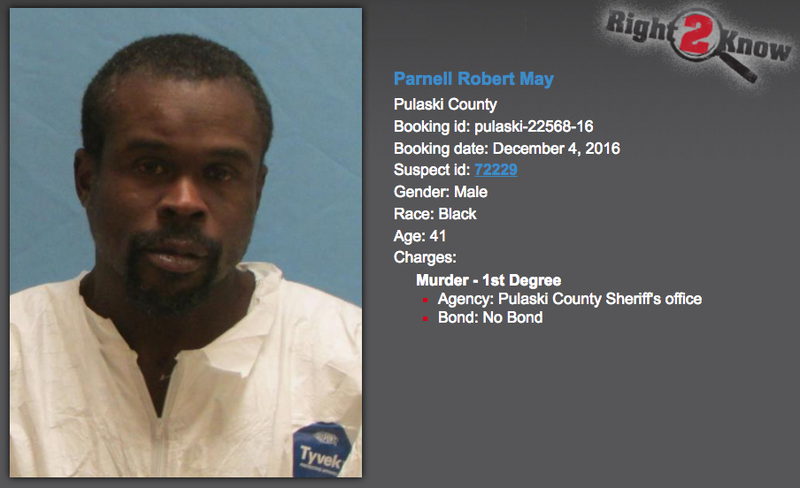Faced with a near-uncontrollable murder defendant and public defenders who said only a court order could get them to take over his defense midtrial, Pulaski County Circuit Judge Leon Johnson excused the jury in Parnell Robert May's trial and reset proceedings in a ruling that will allow prosecutors to retry him in six months.
Charged with first-degree murder in the December 2016 beating death of his girlfriend, May was representing himself.
With DNA, medical evidence, witness testimony and photographs on the cellphone May was carrying when he was arrested, prosecutors Barbara Mariani and Marianne Satterfield said that evidence of May's guilt was "overwhelming."
May insists that Ann Marie Mireles did not die from the brutal, prolonged attack that authorities have repeatedly described for jurors over the previous three days. He told jurors that Mireles died from medical efforts to revive her when she was found, half-naked on the front steps of the couple's North Little Rock home.
He told jurors he's being prosecuted as part of an effort to cover up the real way she died.
May said that, somehow, those rescuers poisoned Mireles with something like rubbing alcohol while also ripping her liver apart by performing cardiopulmonary resuscitation so roughly that many of her ribs were broken.
The medical evidence has not borne this out, to May's ongoing aggravation.
Thursday, May's continued defiance of Johnson's orders and repeated violations of courtroom decorum led the judge to eject him -- twice. Johnson also came close to barring him from attending the rest of the trial.
The judge relented Friday morning, persuaded by arguments from both prosecution and defense that such a prohibition would violate the defendant's constitutional rights. As long as May promises to behave, the law requires that he get to continue his defense, the lawyers said.
A skeptical Johnson warned May that he faced immediate expulsion the first time he did anything disruptive.
The defendant lasted about 90 minutes. Allowed to pick up where he'd left off cross-examining sheriff's investigator Jeff Allison, May's questioning deteriorated into a harangue of the deputy once the judge blocked him from continuing to ask the officer the same questions over and over.
What followed was a repeat of Thursday's actions that got him kicked out of court the first time. A phalanx of bailiffs swept him out of the courtroom as he continued to shout at Allison.
"You fabricated evidence," May called out to Allison. "I didn't kill my girlfriend. I was being honest with you, and you lied on me. I didn't kill her and she wasn't no homicide."
Jurors, told to adjourn, filed out the back of the room while May was taken through another door.
Returned to the courtroom, May was calmer but defiant, repeatedly interrupting and arguing with the judge in a breathless tirade. He was ejected again.
The judge turned to the public defenders to finish the trial for May, but the lawyers, Lou Marczuk and Harrison Tome, said they did not know enough about the evidence to act on his behalf.
"If you order us to proceed, it will be over our protests because we are not ready," Marczuk told the judge.
He asked the judge to grant May a mistrial, arguing that the rare circumstances had reached a point that moving forward had become untenable.
Arkansas law sets the standard for mistrial so high for defendants that they are almost completely barred from causing their own. But the judge concluded that the standard had been met and dismissed jurors, who had been waiting in seclusion.
Throughout the trial, prosecution, defense and judge have each been worried about the prospect of May, a fifth-grade dropout and five-time felon once diagnosed with schizophrenia, acting as his own lawyer.
State doctors have pronounced him mentally competent for trial, and he's met the few legal standards required to act on his own.
The way to proceed with unruly and disruptive defendants is unclear. It's a path that runs between murky case law from the Arkansas Supreme Court and the clear and absolute guarantees of legal representation and fair trial in the U.S. Constitution.
Any breach of May's rights could result in a jury verdict being reversed on appeal, the charges against him being thrown out or a prison sentence based on otherwise inadmissible evidence.
The three-day trial produced a spectacle not seen in the Pulaski County Courthouse for more than a decade.
Friday, May's trial strategy was to make Allison, the detective, hand out autopsy photos to the jurors while having the deputy point out which of the woman's numerous wounds could have gotten blood on his boots.
Later, May asked Allison whether Mireles had reflexively defecated at the moment of death. She had not. At one point, while asking how authorities concluded that Mireles had been fatally beaten with a pipe, May mimicked several swings with a pipe while making his own sound effects about the impact.
In a dramatic lunchtime moment on Thursday, May came close to pleading guilty to murder charges and accepting an 80-year prison sentence but then couldn't bring himself to sign the paperwork.
His lack of legal experience further showed when May told jurors that he had beaten Mireles bloody with a walking stick the night before she was found dead but assured them he had not killed her. Blood from her mouth was on the jeans he was wearing when he was arrested, May said.
He also got a neighbor, James Allen Woodel Jr., to describe how Mireles had showed off bruises on her stomach that May had inflicted during another fight. Woodel also said he saw May threaten to beat Mireles to death during a drunken argument between the couple. May closed his cross-examination of the man by thanking him for his truthful testimony.
Metro on 01/27/2018

